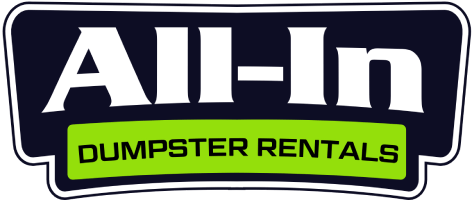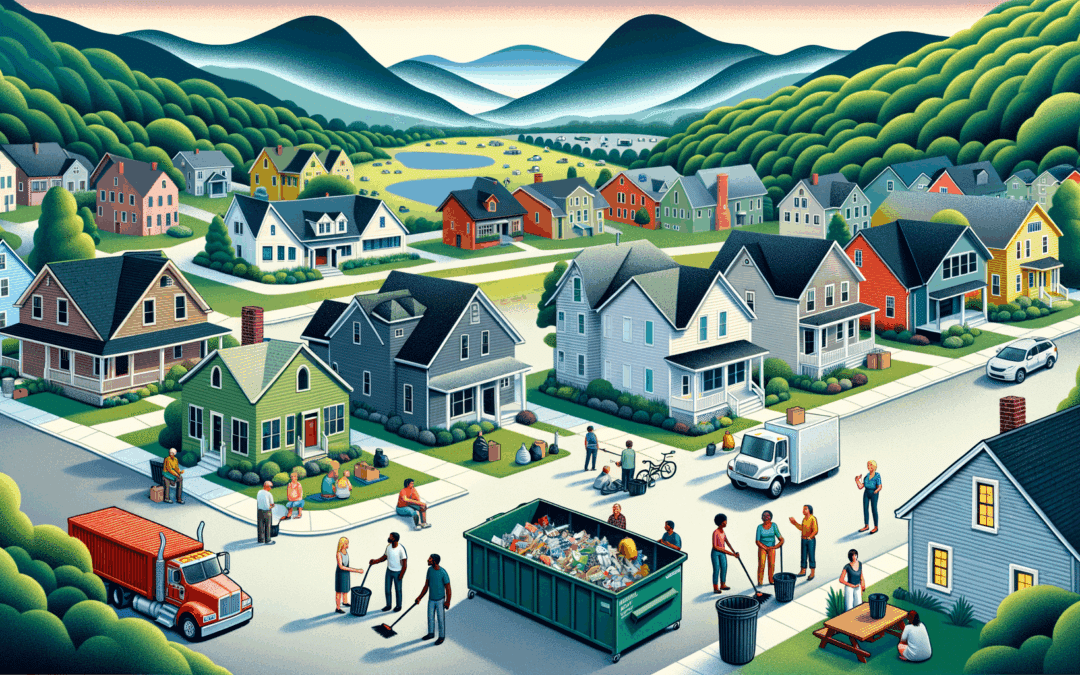Community pride runs deep in Western North Carolina. From the vibrant downtown of Asheville to the quiet neighborhoods of Fairview and Fletcher, there’s something special about how neighbors come together to maintain the natural beauty that makes this region so unique. But when larger cleanup projects arise—whether it’s after a storm, during spring cleaning, or for a neighborhood improvement initiative—the cost of waste removal can add up quickly for individual homeowners.
Here in Asheville, we’ve noticed a growing trend among our customers: neighbors joining forces to tackle cleanup projects together and sharing dumpster rental costs. As a local, family-owned business serving communities throughout Buncombe, Henderson, and Haywood counties, we’ve helped countless neighborhood groups transform their shared spaces while keeping costs manageable for everyone involved.
Let’s explore how you can organize a successful community cleanup with shared dumpster costs that benefits everyone on your street.
Why Community Cleanups Matter in Western North Carolina
Our mountain communities face unique challenges when it comes to waste management. The same beautiful terrain that draws people to the area can make individual property maintenance more challenging, especially on hillsides or wooded lots. Seasonal changes bring their own cleanup needs—from fallen leaves in autumn to storm debris after summer thunderstorms.
Community cleanups offer multiple benefits beyond just cost savings:
First, they build stronger neighborhood bonds. There’s something powerful about working alongside your neighbors toward a common goal. Many of our customers tell us these projects have helped them connect with people they’ve lived near for years but barely knew.
Second, coordinated efforts are more efficient. When neighbors plan together, they can tackle bigger projects like clearing shared spaces, improving drainage areas, or beautifying common areas that benefit everyone.
Third, they’re environmentally responsible. By consolidating waste into a single dumpster rather than making multiple trips to disposal facilities, community cleanups reduce fuel consumption and emissions.
Planning Your Neighborhood Cleanup
The most successful community cleanups start with good planning. Here’s how to get started:
Identify interested neighbors. Start small if this is your first community cleanup. Even just 3-5 households can make significant progress and share costs effectively. Talk to immediate neighbors first, then expand if interest grows. In neighborhoods like Montford or West Asheville, we’ve seen entire blocks participate in seasonal cleanups.
Choose a project scope. Be specific about what your cleanup will tackle. Is it general yard waste collection? Storm debris removal? Clearing out a shared alleyway? Removing invasive plants from a common area? The project scope will determine what size dumpster you’ll need.
Set a date and rain date. Weekends typically work best for most people. In Asheville, spring and fall tend to be ideal seasons for outdoor work. Allow enough time (usually a weekend or two) for everyone to complete their individual contributions.
Discuss budget upfront. Transparency about costs is essential. Determine how you’ll split the dumpster rental fee before ordering. Most neighborhood groups choose to divide costs equally among participating households, but some adjust based on the amount of waste each household contributes.
Calculating Costs and Choosing the Right Dumpster Size
When neighbors share dumpster costs, the savings can be substantial. For instance, a 15-yard dumpster might cost between $300-$400 for a week’s rental. Split between five households, that’s just $60-$80 per family—significantly less than each household renting a smaller dumpster individually or making multiple trips to disposal facilities.
Choosing the right dumpster size is crucial for community cleanups. Too small, and you’ll run out of space before the project is complete. Too large, and you’re paying for unused capacity.
For typical neighborhood cleanups in the Asheville area, we recommend:
10-yard dumpster: Good for 3-4 households doing basic yard cleanup or small projects. This size works well for communities in Woodfin or Weaverville where lots tend to be smaller.
13-yard dumpster: Ideal for 4-6 households or medium-sized community projects. This is our most popular size for neighborhood cleanups in areas like Arden or Fletcher.
15-yard dumpster: Best for larger groups of 6-8 households or extensive projects. Communities in areas like Fairview or Candler with larger properties often prefer this size.
Remember that weight limits apply regardless of dumpster size. Heavy materials like dirt, rocks, concrete, or roofing materials may require special consideration and additional fees, so discuss these needs when ordering your dumpster.
Coordinating Dumpster Placement
Finding the right spot to place your shared dumpster can be tricky in some Asheville neighborhoods, especially those with narrow streets or steep driveways. Consider these factors:
Accessibility: Choose a location that’s easily accessible for all participating neighbors. A centrally located driveway or street parking area often works best.
Permission: If placing the dumpster on a shared driveway or private property, get clear permission from the property owner. If street placement is necessary, check local regulations—some neighborhoods, particularly in historic districts like Montford, may have restrictions.
Surface protection: Dumpsters can be heavy, especially when full. To protect driveways from potential damage, we can place boards underneath the dumpster—just request this when ordering.
Duration: Decide how long you’ll need the dumpster. Most community cleanups can be completed within a weekend, but you might want to schedule a full week to accommodate everyone’s schedules.
Creating a Fair System for Sharing the Dumpster
Without good coordination, shared dumpsters can create frustration if one household fills most of the space. Here are some approaches that have worked well for neighborhoods throughout Western NC:
Time slots: Assign specific loading times for each household, ensuring everyone gets fair access. This works especially well for smaller dumpsters.
Volume limits: Agree on a maximum volume each household can contribute—for example, no more than 20% of the dumpster’s capacity per household in a five-household cleanup.
Type coordination: Organize loading by waste type—for example, one day for yard waste, another for household junk. This helps with efficient packing of the dumpster.
Designated coordinator: Appoint one neighbor to monitor dumpster filling and help resolve any conflicts. This person can also be the main contact for the rental company.
One approach we’ve seen work particularly well in neighborhoods like East Asheville and Black Mountain is creating a simple shared document where neighbors can log what they plan to dispose of. This helps identify potential issues before they arise and ensures the dumpster size is appropriate for the combined needs.
Collecting Money and Managing Finances
The financial aspects of sharing costs need clear handling to avoid misunderstandings. Consider these approaches:
Upfront collection: Collect everyone’s share before ordering the dumpster. This prevents challenges in collecting after the project is complete.
Designated treasurer: One neighbor can handle collecting funds and making the payment. Choose someone everyone trusts.
Digital payment methods: Apps like Venmo, Zelle, or PayPal make it easy to collect and track payments from multiple households.
Written agreement: For larger groups, a simple written agreement outlining costs, payment deadlines, and what happens if additional fees are incurred can prevent misunderstandings.
Most neighborhood groups in the Asheville area find that equal cost-sharing works best, but some adjust based on property size or amount of waste. The key is agreeing on the approach before the dumpster arrives.
Organizing the Cleanup Day
With the dumpster scheduled and finances arranged, it’s time to plan the actual cleanup day:
Create a schedule: Develop a timeline for the cleanup day, including start and end times, breaks, and any shared meals.
Arrange shared equipment: Coordinate sharing of tools like wheelbarrows, chainsaws, or leaf blowers to avoid duplication.
Plan for refreshments: Consider organizing a potluck lunch or refreshment station. Many neighborhoods in Western North Carolina turn cleanup days into social events with food and drinks after the work is done.
Safety considerations: Discuss safety measures, especially when handling heavy items or potentially hazardous materials. Recommend appropriate clothing and protective gear.
Waste sorting: If some materials can be recycled or composted, set up separate collection areas to keep these items out of the dumpster.
Special Considerations for Asheville Area Neighborhoods
Different neighborhoods in the Asheville area have unique considerations for community cleanups:
Historic districts: Neighborhoods like Montford or Chestnut Hill may have restrictions on where dumpsters can be placed. Check with your neighborhood association.
Mountain communities: Areas like Fairview or Leicester with steep terrain may need special planning for dumpster placement and safe debris movement.
HOA communities: If your neighborhood has an HOA, check if there are existing policies for community cleanups or if the HOA might contribute to costs.
Rural communities: In areas like Candler or Leicester, neighbors might be more spread out, requiring more coordination for a central dumpster location.
What Not to Put in Your Shared Dumpster
When sharing a dumpster, it’s especially important that everyone understands what items are prohibited. Make sure all participating neighbors know not to include:
• Hazardous waste (paint, chemicals, oils, batteries)
• Electronics (TVs, computers, printers)
• Appliances with refrigerant (refrigerators, air conditioners)
• Tires
• Liquids of any kind
For these items, share information about Buncombe County’s special waste disposal options or other appropriate disposal methods.
Beyond One-Time Cleanups: Building Lasting Community Connections
Many neighborhoods that start with a single shared dumpster project discover it’s just the beginning of community collaboration. Here’s how some Western NC neighborhoods have built on their cleanup success:
Regular cleanup schedules: Some communities now organize seasonal cleanups, particularly in spring and fall, with shared dumpster costs as a regular part of neighborhood life.
Expanded projects: What starts as basic cleanup often grows into more ambitious community improvements—creating shared gardens, improving drainage, or establishing natural play areas.
Stronger community ties: Working together on practical projects builds relationships that extend beyond cleanup day. Many neighborhoods report increased community engagement overall after successful shared projects.
Knowledge sharing: Neighborhoods learn from each other’s experiences. Communities in North Asheville have started sharing their cleanup strategies with neighborhoods in West Asheville, creating a broader network of community improvement.
Here at All-In Dumpster Rentals, we’re proud to support these neighborhood initiatives throughout Western North Carolina. As a local family business, we understand the importance of community and take pride in helping neighbors work together to keep their shared spaces beautiful.
Ready to plan your neighborhood cleanup? Give us a call at (828) 776-5517 to discuss group rates and find the perfect dumpster size for your community project. Our team is happy to provide advice based on our experience with similar projects throughout Asheville and surrounding communities.
Remember, when neighbors share the load—both the work and the cost—everyone benefits from cleaner, more beautiful surroundings and stronger community bonds.

